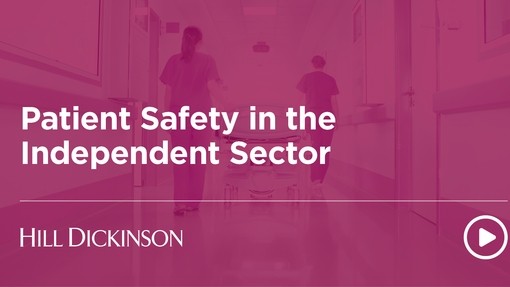NHS Integration focus - Place – what is it and where does the independent sector fit in?

Details
Within the NHS some key recent news is that the Health and Care Bill is now an Act signalling full steam ahead to 1 July 2022 when many elements of NHS structural reforms, including the dissolution of more than 100 Clinical Commissioning Groups (CCGs) and formation of 42 Integrated Care Boards (ICBs) inheriting CCG functions, will take effect. Outside of the Act, a number of other non-statutory entities are also being developed in the run up to July with a key role to play in delivering the reforms. One such entity is the Place-based Partnership (PBP). But what is Place, and where might independent sector providers to the NHS and broader public sector fit in?
What is Place?
The reforms aim to join up healthcare across the footprints of integrated healthcare systems and encompass a focus not only on healthcare itself, but on the determinants of improved health for the whole population including links between health and social care and other relevant services. Place has been expressed as ‘the foundation’ of that integrated care with a key role in ‘levelling up’ health inequalities. While the headline structural reform is the creation of ICBs, the reality for people is that no matter which broader healthcare system they formally sit within, they look to their local geography or ‘Place’ for the services that they need. As such, while CCGs may disappear on 1 July, their footprints live on as the localities served by PBPs, collaborative arrangements between the organisations responsible for arranging and delivering health and care services in that community taking a central role in planning and improving health and care services in response to population need. As the ICB evolves beyond 1 July, and PBPs also develop, they are expected to take on formal delegated functions, including commissioning, from the ICB, NHS providers and local authorities. In time, PBPs are expected to manage significant spend.
Independent sector implications
In terms of impact, the key point for independent sector providers to understand is that while the public sector is undoubtedly leading the focus on localised planning, integration, and consequent improvements in population health, those aims can be supported and influenced by a wide range of organisations outside of the NHS, including those within the independent sector. Many PBPs are not new having already been developed in a variety of forms in recent years, and some independent sector providers may already be involved or familiar with them. The need for independent healthcare providers to supplement NHS health provision will undoubtedly continue and it will be important to continue to build relationships locally and demonstrate value to the public sector to retain or obtain those contracts. Social care provision is another key area to focus on, and the way that this supports and dovetails with healthcare services, working, and being seen to work, effectively for local populations. Beyond that focus on data, technology, and innovative solutions to help PBPs plan and monitor the impact of their inputs both at a local level and across the system as a whole may also provide opportunities for the independent to support and add value.
Further detail
For more information on the role of Place within the integrated care system, and on the role of Place based partnerships and the reforms more generally, please see our articles about these:
From safe landing to real impact: the next phase for Place-based Partnerships






